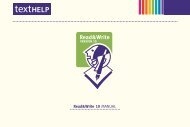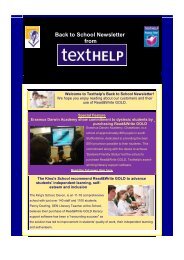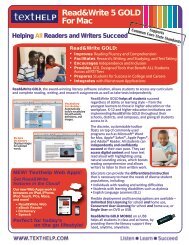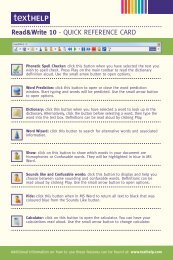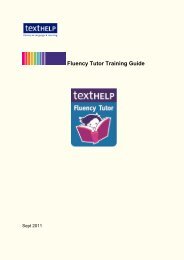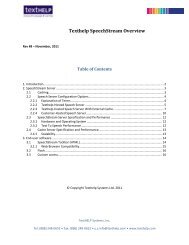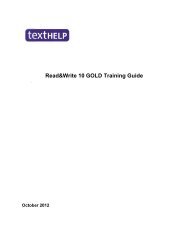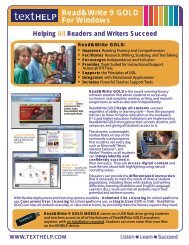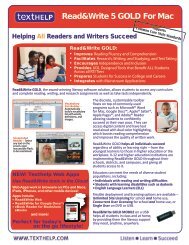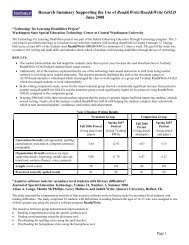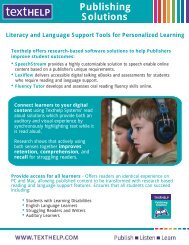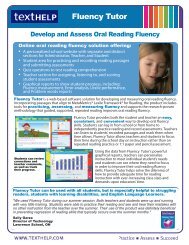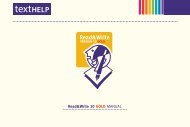01 NRDC Dyslexia 1-88 update - Texthelp
01 NRDC Dyslexia 1-88 update - Texthelp
01 NRDC Dyslexia 1-88 update - Texthelp
You also want an ePaper? Increase the reach of your titles
YUMPU automatically turns print PDFs into web optimized ePapers that Google loves.
<strong>88</strong><br />
Research Report<br />
We end with answers to the questions with which we began. It appears that:<br />
There are many reasons why people find it difficult to learn how to read, write and spell.<br />
With some learners, we identify the causes of their difficulty as predominantly a matter of<br />
experience.<br />
With other learners, we conjecture that the causes of their difficulty are predominantly a<br />
question of biology.<br />
Either way, we acknowledge that developmental outcomes reflect interactions between<br />
experience and the human organism.<br />
The research on ‘developmental dyslexia’ in children can help adult literacy tutors to<br />
respond to the needs of adult students, insofar as the research addresses fundamental<br />
issues in language acquisition.<br />
It is by no means certain that the categorical distinctions embodied in terms such as<br />
‘dyslexic’ and ‘non-dyslexic’ correspond to distinct realities when the individual person<br />
(rather than the behaviour) is the unit of analysis.<br />
In our present state of knowledge, it does not appear to be helpful for tutors to think of some<br />
of their students as ‘dyslexics’ and of others as ‘ordinary poor readers’.<br />
The screening of adult literacy students for ‘dyslexia’ is difficult to justify on either<br />
theoretical or practical grounds.<br />
By contrast, the psychometric assessment of reading-related skills is essential and every<br />
adult literacy teacher should be competent in it.<br />
Even if dyslexia were to prove categorically rather than dimensionally different from ordinary<br />
poor reading, tutors are not resourced to determine the issue and screening tests yield high<br />
rates of false positives.<br />
Telling a tutor that a student is ‘dyslexic’ may elicit a number of inappropriate assumptions<br />
about the student’s problems and abilities.<br />
The research does not indicate that a different curriculum should be followed for ‘dyslexics’;<br />
the curriculum will depend very much on the needs of each individual student.<br />
The research does not indicate that ‘dyslexics’ and ‘ordinary poor readers’ should be taught<br />
by different methods; however, the methods promoted as specialist interventions for<br />
dyslexics are well-suited to be mainstream methods of reading instruction, which is how<br />
they originated.<br />
‘<strong>Dyslexia</strong>’ is not one thing but many, to the extent that it may be a conceptual clearing-house<br />
for a variety of difficulties with a variety of causes.<br />
Different explanations of ‘dyslexia’ indicate different responses to the difficulties of different<br />
‘dyslexic’ students, but the evaluation research on these responses is very limited.



